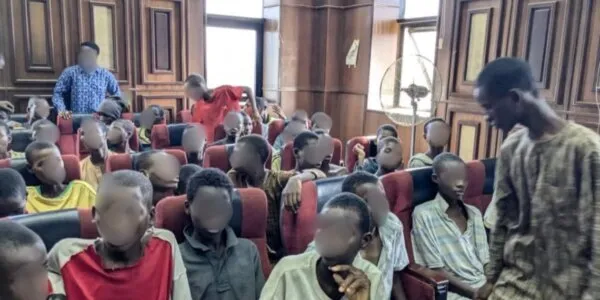
Source: Fortune Eromonsele

The children in court used to illustrate the story (PHOTO CREDIT: Punch)
A new assessment by the United Nations Children’s Fund (UNICEF) has exposed harrowing realities in Nigeria’s juvenile justice system, where thousands of children and young adults are locked away without trial, legal representation, or even a glimmer of justice.
According to the report released on Monday, many children are being detained not for committing serious crimes, but for petty offenses—or simply because they are poor and forgotten.
“The only ‘crime’ is often being poor or forgotten. This is not justice,” UNICEF declared.
UNICEF’s data, gathered between 2018 and 2022 from 87 adult custodial centres, 22 remand homes, and three borstal institutions, reveals that 133,906 children and young adults were detained during the five-year period. Shockingly, 92% were held in adult prisons, environments entirely inappropriate for minors.
Even more troubling, only 26% had been convicted. The remaining majority were either awaiting trial or lacked basic case documentation. 68% had no legal representation, and many had never appeared before a judge. Trials were often delayed due to missing case files, unavailable witnesses, or inability to pay bail.
In 17 states, 47% of children in remand homes were jailed for petty crimes like stealing. Others were imprisoned for wandering, trespassing, or being considered “beyond parental control.” Some were even detained for their “protection.”
Most detainees came from low-income families, often in polygamous or overcrowded households. Few had parents with formal education—only 15% had a parent with a university degree.
Conditions in detention centres are dire. Cells are overcrowded, poorly ventilated, and lack basic sanitation. Children must provide their own bedding and toiletries.
The report found that:
Despite 80% reporting access to healthcare, 62% found the services inadequate. Instances of sexual abuse and severe psychological trauma were also documented.
The Legal Aid Council of Nigeria (LACON) was found to be under-resourced. Only 12% of detained children had LACON representation, with another 12% supported by Ministry of Justice officials. A mere 0.7% received NGO support.
Oversight bodies like the Administration of Criminal Justice Monitoring Committee (ACJMC) and the National Human Rights Commission (NHRC) were seen as largely ineffective, with less than half visiting detention centres regularly.
UNICEF has urged the Nigerian government to:
“Every child deserves safety, dignity, and justice,” the agency said.
“A cell is no place for a child.”
#EndChildDetention #JusticeForChildren
The Child Rights Act (CRA) was enacted in Nigeria in 2003 to protect children’s rights in line with the UN Convention on the Rights of the Child. It defines a child as any person under the age of 18 and grants rights to education, healthcare, protection from abuse, and full development.